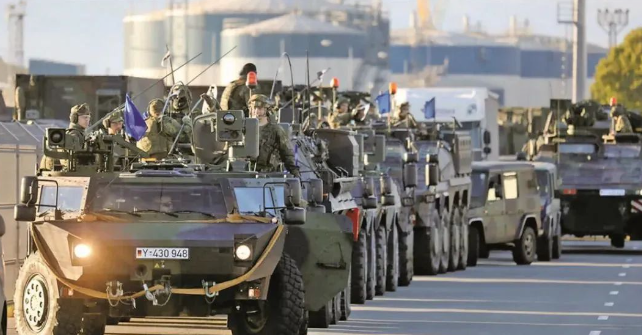
About 100 German troops and 40 vehicles arrived in Lithuania on September 4, 2022 (File photo)
It is reported that during the visit to Lithuania on June 26, German Defense Minister Boris Pistorius announced that the country plans to permanently station a brigade of 4,000 troops in Lithuania.
Since 2017, Germany has had about 800 Bundeswehr troops permanently stationed in Lithuania as part of the NATO military force, and another 650 troops temporarily stationed in this region after the outbreak of the Ukraine crisis. Military observer Teng Jianqun pointed out that Germany's plan to permanently station 4,000 soldiers is most different from previous operations in that a fixed military post will be established in Lithuania to ensure the permanent stationing of German military in the region. In addition, a permanent commanding institution will also be included in the command-and-control system to manage the dispatched troops.
Previously, Lithuania had repeatedly appealed to NATO to deploy combat troops in countries bordering the Russian enclave of Kaliningrad. As to Lithuania's appeal, Teng analyzed that on the one hand, Lithuania intends to safeguard national security by relying on the strength of NATO and to reduce security anxiety through the mutual defense clause announced by the organization. On the other hand, Lithuania hopes to take the opportunity to strengthen security and military cooperation with Germany.
In this regard, German Defense Minister Boris Pistorius said during his visit to Lithuania that as a NATO member state and the largest economy in Europe, Germany bears the responsibility and obligation to protect the security of NATO's eastern flank members.
In Teng's view, the plan of Germany not only represents a direct response to the current Russia-Ukraine situation from NATO, but is also an inevitable result of the strategic security adjustment and transformation of Germany. As the Russia-Ukraine conflict persists, NATO forces are forwardly deployed on the eastern flank. Germany's proposition of permanent troop stationing in Lithuania signalizes that NATO's defense focus continuously expands to some countries neighboring Russian border areas. Germany's security strategy is undergoing a significant change, aiming to win the country a dominant role in European security affairs by taking advantage of NATO.
It is worth noting that this move unveils the strategic transformation direction of Germany. The German National Security Strategy first released by the German Federal Government a few days ago provides a comprehensive and systematic analysis of the German security environment, with a focus on era change.
Teng pointed out that Germany's current series of actions indicate that the Scholz government has constantly made security and military policy adjustments based on the situation of the Russia-Ukraine conflict since the inauguration, targeting a more offensive national defense strategy. The current policy of the country is mainly to follow the US and actively strengthen military buildup and combat readiness, which runs counter to the strategy to balance the US and Russia adopted by the Merkel government. This is not necessarily bullish for Germany and regional security.
Editor's note: Originally published on china.com.cn, this article is translated from Chinese into English and edited by the China Military Online. The information and opinions in this article do not necessarily reflect the views of eng.chinamil.com.cn.













